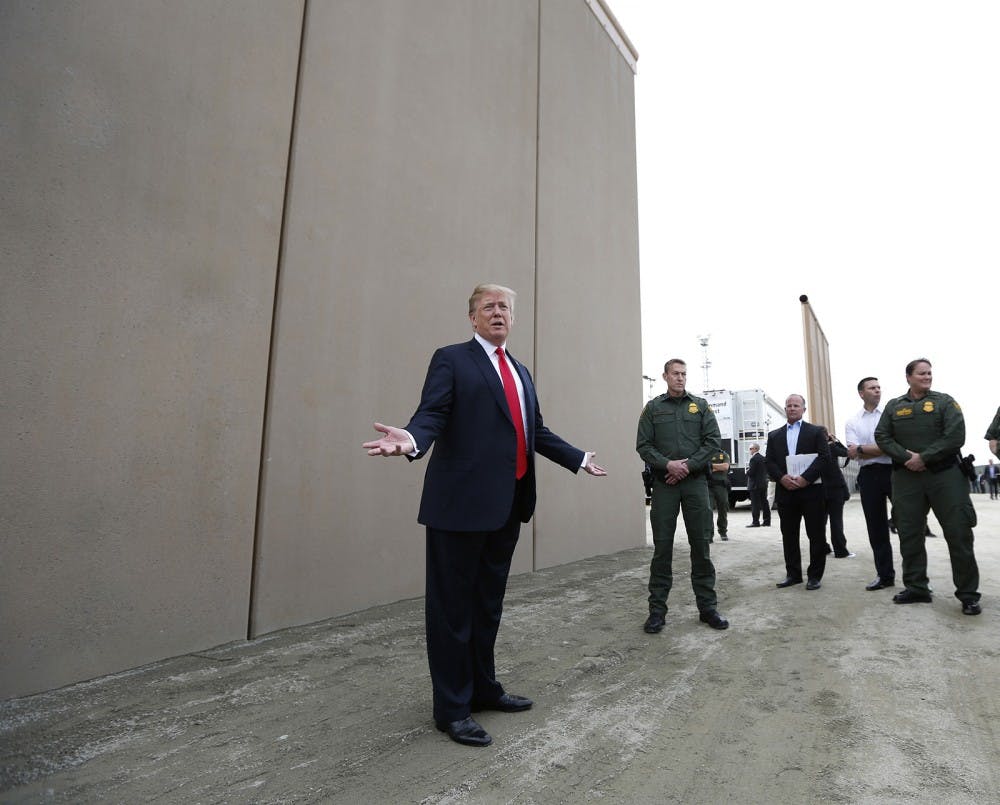WASHINGTON — President Donald Trump will address the nation on Tuesday night and travel on Thursday to the U.S.-Mexico border to press his case for a wall there, amid a partisan funding impasse over the issue that has kept the government partially shut down into a third week.
The president tweeted on Monday that he would speak on national television at 9 p.m. Eastern time Tuesday "on the Humanitarian and National Security crisis on our Southern Border." Earlier, Press Secretary Sarah Huckabee Sanders tweeted that Trump would travel to the border two days later, suggesting the White House sees no end to the standoff for most of this week.
The president will go to McAllen, Texas, a senior administration official confirmed later Monday on condition of anonymity.
Democrats and other critics, as well as some Republicans, have disputed Trump's characterizations of conditions at the border as a national security crisis. His and Sanders' claims that 4,000 terrorists have entered the country have been debunked by administration data and the State Department has reported that no member of a terrorist group had entered from Mexico.
Undaunted by questions from White House reporters about the discredited claims, Trump's Homeland Security secretary, Kirstjen Nielsen, replied that "one terrorist is too many" and dismissed the State Department's report as outdated, without suggesting any terrorists had been apprehended subsequently.
Even as the pain of the shutdown is being increasingly felt — including at national parks, where access is limited and trash piles up, and at the nation's airports, where security officials are among the hundreds of thousands of federal employees working without pay – Trump emphasized again on Sunday that unless Democrats agreed to his demand for $5.7 billion to build a wall, he was prepared for the standoff "to go on for a long time."
"There's not going to be any bend right here," he told reporters at the White House.
Trump also said that if the impasse persisted, he might declare a national emergency to bypass Congress and use existing funds for the military to construct a wall.
While the president played down the impact of a shutdown in its 17th day, his administration maneuvered to head off further disruptions of the sort that could most irk Americans.
His budget office directed the Internal Revenue Service to process tax returns and refunds when the filing season begins late this month, even if the shutdown goes on. Federal courts have been asked to defer noncritical activities so they can remain open for essential cases through at least Jan. 18 using fees and other existing funds. And park managers have been allowed to tap entrance fees to hire cleanup crews, though such money isn't supposed to go to that purpose.
After stoking fears of a migrant caravan in the run-up to the November elections, the president has continued to depict a crisis on the border to pressure Democrats to accede to his demand.
Democrats have resisted and continue to try to pressure him to reopen the government before they will negotiate further on border security funding.
On Thursday, House Democrats approved two bills to reopen the government, one of which included $1.3 billion in border security funding. Senate Republicans, however, refused to take up the bills without Trump's support, having passed similar bills unanimously last month only to have him oppose the legislation — provoking the shutdown on Dec. 22.
This week, House Democrats plan to pass similar bills, ratcheting up pressure on the Republican-controlled Senate and Trump.
In the Senate, Democrats plan to stage a protest Tuesday evening and vote against taking up an unrelated bill that Senate Majority Leader Mitch McConnell, R-Ky., has scheduled.
"We should be voting on the bipartisan bills from the House to reopen the government," Sen. Brian Schatz, D-Hawaii, tweeted. "Senate Republicans should not treat this legislative work period like it's a time to catch up on miscellaneous items. People are suffering. Let's vote to fix it."
Negotiations over the weekend failed to produce a breakthrough, in large part because Vice President Mike Pence, assigned by Trump to lead the talks, met with senior aides to congressional leaders rather than the principals. The House and Senate aides were not authorized to negotiate, according to a White House official who was in the meetings.
Congressional leaders in both parties have been reluctant to make commitments without personal assurances of agreement from Trump, given his history of backing out of deals or changing his position without informing his aides.
While Trump and Democrats separately told reporters Sunday that no progress was made in the weekend talks, Pence told reporters at the White House on Monday: "We made progress in establishing the fact that we do have a humanitarian and security crisis at our southern border.
"If we can agree on the facts first, in any situation, they become a foundation for agreeing on the solution," he added.
Nielsen, who was at the White House briefing with Pence, said "there's a real sense of urgency" and that "the crisis is getting worse."
Yet a Democratic aide familiar with the weekend talks disputed that Democrats agree there is a crisis. House Speaker Nancy Pelosi, among others, have said that Trump is manufacturing a crisis to justify his political promise to his hard-right followers.
Democrats insist that Trump open the government before they will negotiate over the wall.
Pelosi has called Trump's proposal to build a border wall immoral, suggesting she is also dug in. Democrats have approved border fencing proposals in prior years' compromises, but now believe the issue has become politically toxic among voters on the left because it is so identified with Trump.
On the weekend, as something of a concession, the administration proposed to revive Obama-era programs that enabled Central American minors to apply for U.S. asylum in their home countries, rather than making the dangerous journey north.
That's a reversal for the Trump administration, which abruptly ended two Obama administration refugee programs soon after Trump took office; one allowed those with family in the United States to apply in their countries for refugee status. The administration has also slashed annual refugee admissions from the Caribbean and Latin America.
Cutting the programs stranded thousands of children. Most of the 13,000 applicants came from El Salvador, a country with one of the highest homicide rates in the world for those under age 19.
Still, little evidence supports Trump's claim of a crisis.
In the most recent budget year that ended Sept. 30, the number of people apprehended or refused entry at the border stood at just over 520,000, or about half the number in many years from the 1980s to the mid-2000s.
However, immigration officials are seeing a dramatic rise in families and unaccompanied minors at the border, mostly from Central America. The administration says that the Border Patrol has been overwhelmed by the surge; processing and detention facilities for decades have been primarily designed for single adult males.
In November, Border Patrol agents apprehended 25,172 family members on the border, a record, and 5,283 unaccompanied minors. Yet even if the pace of migrant children traveling north without adults continues, the influx won't come close to the numbers of unaccompanied minors who came in 2014 — more than 67,000 — which was widely considered a crisis.
The president has also claimed a terrorist and crime threat at the border. That, too, is debunked by administration documents.
Many of the administrative arrests by the Immigration and Customs Enforcement agency involve immigration violations rather than violent crimes. The State Department said as recently as July 2017 that there is "no credible information that any member of a terrorist group has traveled through Mexico to gain access to the United States."
(Los Angeles Times staff writers Jennifer Haberkorn and Jim Puzzanghera contributed to this report.)
© 2019 Los Angeles Times
Visit the Los Angeles Times at www.latimes.com
Distributed by Tribune Content Agency, LLC.
Do you like this story? The Plainsman doesn't accept money from tuition or student fees, and we don't charge a subscription fee. But you can donate to support The Plainsman.





